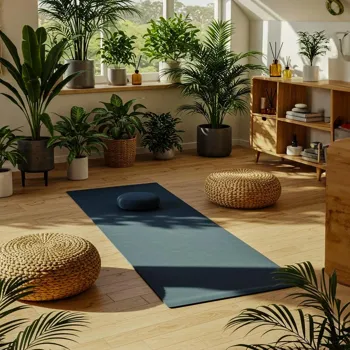Discover how to infuse mindfulness into your daily routine effortlessly. Uncover simple yet powerful tips to enhance your well-being
In today's fast-paced world, where deadlines loom large and notifications
buzz incessantly, it's easy to get caught up in the whirlwind of daily life. Our minds race from one task to the next, often neglecting the present moment.

This constant mental chatter can lead to stress, anxiety, and a general sense of disconnect. But what if there was a way to slow down, find inner peace, and appreciate the beauty of everyday experiences? The answer lies in mindfulness – a simple yet powerful practice that can transform your life.
Mindfulness, at its core, is about paying attention to the present moment without judgment. It's about observing your thoughts, feelings, and sensations as they arise and pass, without getting carried away by them. Think of it as being a neutral observer of your own inner world.
Practicing mindfulness allows you to cultivate a sense of awareness, helping you to break free from automatic patterns of thinking and behaving.
Many people find that integrating mindfulness into their daily routine can improve their overall well-being, reducing stress, enhancing focus, and fostering a greater sense of calm.
It's about taking small moments throughout your day to simply be present, to fully experience what you're doing, and to appreciate the here and now. Learning mindfulness isn't a huge task; it involves making small adjustments to your everyday life.
Let's explore some simple ways to make mindfulness a natural part of your daily life.
Mindful Breathing:
Start your day with a few moments of mindful breathing. Find a comfortable position, either sitting or lying down, and close your eyes gently. Focus your attention on your breath, noticing the sensation of the air entering and leaving your body.

Pay attention to the rise and fall of your chest or abdomen. When your mind wanders, as it inevitably will, gently redirect your focus back to your breath. Even just a few minutes of mindful breathing can help to calm your mind and set a positive tone for the day.
You can do this while you are in the bus or even before your meetings. When you become aware of your breath, you will be able to bring yourself to the present moment easily. This will allow you to focus on a present task without being afraid of what you will do in the future.
Mindful Walking:
Transform your daily walk into a mindful exercise. As you walk, pay attention to the sensations in your body – the feeling of your feet on the ground, the movement of your muscles, the air on your skin. Notice the sights, sounds, and smells around you.

Avoid getting lost in your thoughts about the past or future. Instead, focus on the present moment, observing the world around you with a sense of curiosity and wonder. You can do this while you are going to the shop near your house or when you do your morning walk.
This makes you grounded and it helps you appreciate the present moment. Slow down your pace and feel fully connected to the ground.
Mindful Eating:
Eating is often a rushed and mindless activity. Try to incorporate mindfulness into your mealtimes. Before you begin eating, take a moment to appreciate the food in front of you – its colors, textures, and aromas. As you eat, pay attention to the flavors and sensations in your mouth.
Chew your food slowly and deliberately, savoring each bite. Avoid distractions like your phone or television. By eating mindfully, you can not only enjoy your food more but also become more aware of your body's hunger and fullness cues, leading to healthier eating habits.
This is very important because it reduces overeating.
**
Mindful Listening:**
In our busy lives, we often listen to respond rather than to truly understand. Practice mindful listening in your conversations with others. Give the person your full attention, making eye contact and avoiding distractions. Listen without interrupting or formulating your response.

Focus on understanding their perspective, even if you don't necessarily agree with it. Mindful listening can improve your relationships and foster deeper connections with others.
This not only allowa you to listen attentively to others but also allow you to learn more.
Being mindful helps you understand the feelings of others and makes connections better.
Mindful Chores:
Turn mundane chores into opportunities for mindfulness. Whether you're washing dishes, folding laundry, or sweeping the floor, bring your full attention to the task at hand.

Focus on the sensations involved – the feel of the water on your hands, the smell of the detergent, the rhythm of your movements. Let go of any judgment or frustration and simply be present with the activity.
You might be surprised at how enjoyable even the most mundane chores can become when approached with mindfulness.
Mindful Moments:
Sprinkle mindful moments throughout your day. Set a timer to go off every hour or two and use that time to pause, take a deep breath, and check in with yourself. Notice how you're feeling, both physically and emotionally. Acknowledge any thoughts or emotions that are present without judgment.

Simply observe and allow them to pass. These brief moments of mindfulness can help you stay grounded and connected throughout the day.
Mindful Technology Use:
Our devices, though useful, can pull us away from the present. Set limits on your screen time and be mindful of how you're using technology. Before you reach for your phone, ask yourself why you're doing it. Are you genuinely needing to connect with someone, or are you just seeking a distraction?

When you are using technology, be present and focused, avoiding multitasking.
Also avoid spending more time on social media and try to use the device only when needed.
Mindful Appreciation:
Take a moment each day to appreciate the good things in your life. This could be anything from a beautiful sunset to a kind gesture from a friend or family member. Write down three things you're grateful for each day or simply take a moment to reflect on the positive aspects of your life.

Cultivating gratitude can boost your mood and increase your overall sense of well-being.
Mindful Bedtime Routine:
Prepare for sleep with a mindful bedtime routine. Avoid screens at least an hour before bed and engage in relaxing activities such as reading a book, taking a warm bath, or listening to calming music. Practice a few minutes of mindful breathing or meditation before drifting off to sleep.

A mindful bedtime routine can help you unwind and prepare for a restful night's sleep.
Mindful Patience:
Life is full of unexpected delays and frustrations. Practice patience by accepting these moments as opportunities for mindfulness. Instead of getting angry or frustrated, take a deep breath and observe your reactions without judgment.

Remind yourself that everything is temporary and that this too shall pass. Mindful patience can help you navigate challenging situations with greater calm and resilience.
Each para should have 350 characters or 2 sentences
The beauty of mindfulness is that it can be practiced anytime, anywhere.
It doesn't require any special equipment or training. It just requires a willingness to be present and to pay attention to the present moment.
With consistent practice, you can learn to cultivate a sense of mindfulness that permeates every aspect of your life, leading to greater peace, joy, and well-being.
Mindfullness can begin by finding some free time within your daily life to focus on a singular objective, such as how your feet feel.
Incorporating mindfulness into your daily routine may seem challenging at first, but with patience and persistence, it can become a natural and rewarding part of your life. Start with small, manageable steps and gradually increase the amount of time you dedicate to mindfulness each day.
Remember, it's not about being perfect; it's about making a conscious effort to be present and to appreciate the beauty of the here and now.
It teaches us to be okay, even if we have to face problems every day with a clam and peaceful mind.
Mindfulness is not a quick fix or a magical cure-all.
It's a practice that requires consistent effort and commitment. There will be times when you struggle to stay present or when your mind wanders incessantly. Don't get discouraged. Simply acknowledge your thoughts and feelings and gently redirect your focus back to the present moment.
With time and practice, you'll find that mindfulness becomes easier and more natural.
With the power of mindulness, you can improve your relationships with people.
The benefits of mindfulness are numerous and well-documented.
Studies have shown that mindfulness can reduce stress, anxiety, and depression, improve focus and concentration, enhance creativity, and foster a greater sense of empathy and compassion.
By incorporating mindfulness into your daily routine, you can unlock your full potential and live a more fulfilling and meaningful life.
It can help you to cultivate self awareness and understand all that's making your body feel.
Mindfulness is not just a personal practice; it's also a way of being in the world. By cultivating mindfulness, you can become more aware of your impact on others and the environment. You can make more conscious and compassionate choices, contributing to a more peaceful and sustainable world.
It’s also a state of mind that allows you to experience life’s joys.
It helps you become a better version of yourself, while allowing you to be present in the current day.
So, take a deep breath and begin your journey towards a more mindful life.
Start with one or two of the simple tips mentioned above and gradually incorporate more as you become more comfortable with the practice. Remember, it's not about doing it perfectly; it's about making a conscious effort to be present and to appreciate the beauty of the here and now.
Your mind will greatly benefit from mindfulness.
Incorporating even micro-moments of mindfulness into everyday actions can dramatically improves focus.











